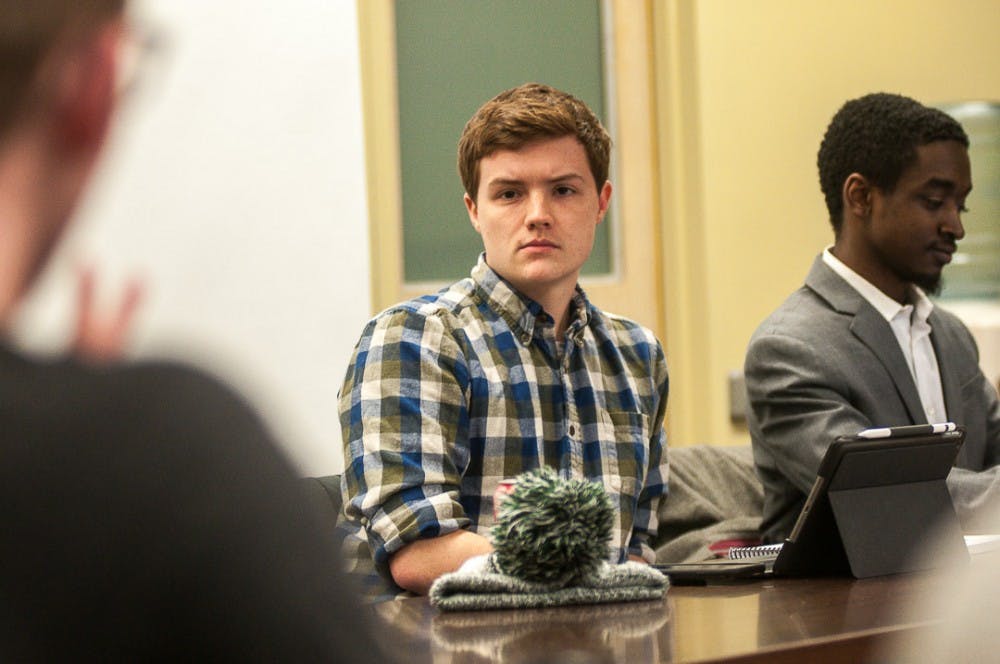In response to Michigan State cancelling classes during the polar vortex that struck the Midwest, improvements to university's hazardous weather policies were addressed at the Associated Students of Michigan State University’s Feb. 7, committee meetings.
In addition to this discussion, a representative from the National Pan-Hellenic Council came to advocate for her organization in finance committee and in policy committee, members addressed a bill that was first passed in 2015, but would expired after this year if not readdressed.
Here are three takeaways from the undergraduate student government's committee meetings.
Pushing for better hazardous weather policies
The academic committee passed a bill advocating for MSU to develop better methods of protecting students during hazardous weather conditions. This includes the implementation of online sessions to prevent travel in dangerous conditions, minimizing mandatory attendance policies in these cases and improving travel infrastructure.
“We need to try to limit situations as much as possible where students have to place academics in a balance with their health and safety,” Lyman Briggs representative Ben Horne, who introduced the bill, said. “There needs to a better system in place, there needs to be better travel infrastructure. We need to have better plans in place to protect our students.”
College of Music representative Isaiah Hawkins seconded the bill, and addressed the dangers that severely cold weather can place on students, especially at a campus of MSU’s size.
“It shouldn’t be a game of ‘will they, won’t they’ when wind chills are projected to be in the negative 20s,” Hawkins said. “...Our campus is so large that there are a number of very devastating scenarios that can happen.”
Hawkins said he hopes the advocation of these policies would make it “more likely that the university would feel comfortable with calling a snow day.”
College of Business representative Olivia Long supported the bill, however she questioned its specificity, especially in terms of who and what exactly determines “hazardous weather.”
Regardless, the bill passed through the academic committee and will be voted on by the general assembly at the next meeting.
“This is explicitly not students saying, ‘We want more snow days.' This is saying on days where we have class we should be able to get to class safely,” Horne said.
Advocating for affirmative consent education
The policy committee passed a bill that will continue to enable the Office of Governmental Affairs to advocate for K-12 sexual education to include affirmative consent, or 'yes means yes' language.
In September 2015, ASMSU’s 52nd session originally passed this bill. However, per the ASMSU General Assembly Code of Operations, bills passed through the GA become ineffective three years after their passing, meaning this bill regarding affirmative consent would expire at the end of this year.
“The vast majority of students ... that come to Michigan State come from Michigan schools, so their views on sex and on consent are going to be shaped in large part by the sex education that they had in their schools," Hawkins, who introduced the bill, said. "If we can advocate for a way to shape that, that will have a very positive effect on the environment and climate around consent and sexual relations on this campus.”
Vice President of Governmental Affairs Maysa Sitar seconded the bill by expressing the importance of sexual education including affirmative consent prior to an individual's arrival to college.
“You are most likely to be sexually assaulted as a freshman your first semester of college so anything that we can do while we are in college is not going to be quite as effective as affirmative consent education beforehand,” Sitar said.
National Pan-Hellenic Council banquet approved
The finance committee passed a bill allocating $5,000 to the National Pan-Hellenic Council to plan and host an awards banquet with a vote of 10-0-2.
Support student media!
Please consider donating to The State News and help fund the future of journalism.
National Pan-Hellenic Council is the governing body for historically black fraternities and sororities.
Savannah Guinyard, a member of NPHC, introduced the bill by highlighting the separation that organizations like NPHC and the Multicultural Greek Council face with other greek bodies such as the Panhellenic Council and the Interfraternity Council.
Specifically, Guinyard addressed how National Pan-Hellenic Council and the Multicultural Greek Council are excluded from the yearly “Greek Gala” event hosted by the Panhellenic Council and the Interfraternity Council.
“We feel like since this is a Greek event, why wouldn't we be allowed to be involved?" Guinyard said. "We put in a lot of work. We do a lot of community service, we are always active in the community and we would like to be recognized for our work also."
Guinyard explained both the National Pan-Hellenic Council and the Multicultural Greek Council have reached out to the Panhellenic Council and the Interfraternity Council regarding the situation, however little has been done.
Guinyard explained that they plan on using the allocation to host their own banquet, however in the future, they plan on working to be included in the Greek Gala.
On Feb. 14, the ASMSU General Assembly will meet in the International Center.
Discussion
Share and discuss “ASMSU discusses improving student safety during hazardous weather ” on social media.








